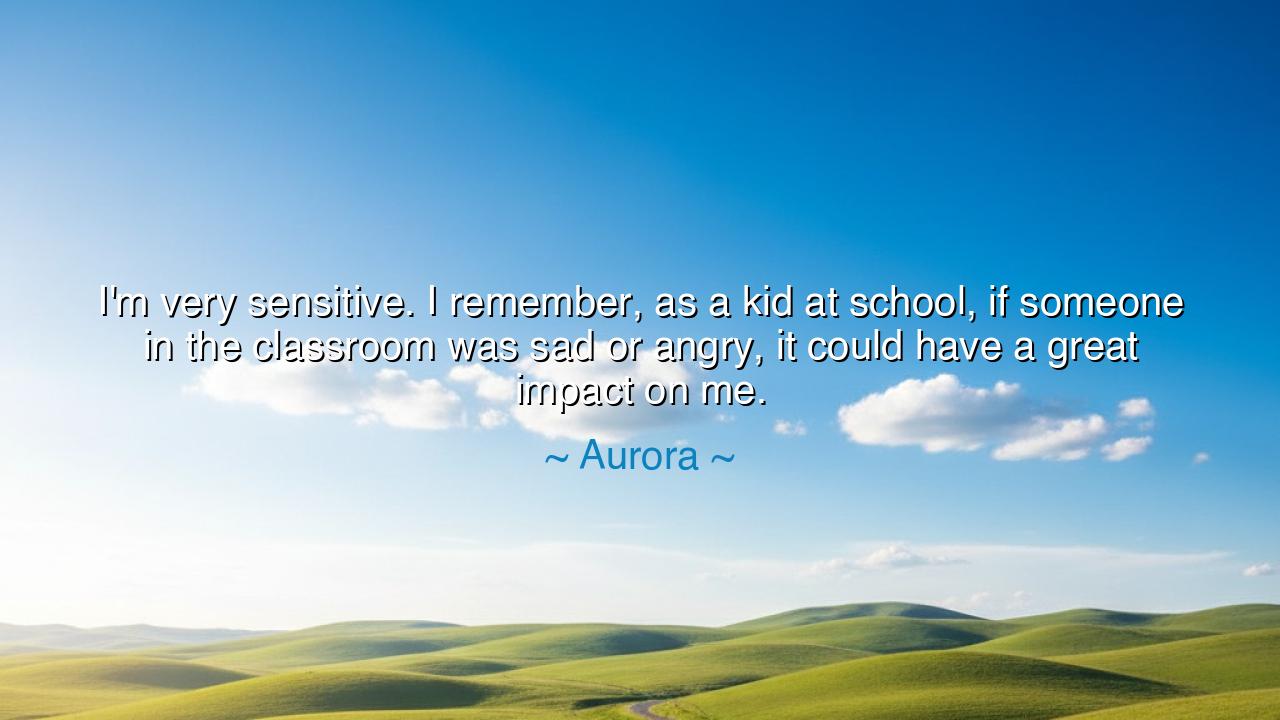
I'm very sensitive. I remember, as a kid at school, if someone in
I'm very sensitive. I remember, as a kid at school, if someone in the classroom was sad or angry, it could have a great impact on me.






When Aurora said, “I’m very sensitive. I remember, as a kid at school, if someone in the classroom was sad or angry, it could have a great impact on me,” she was revealing the soul of the empath, the person whose heart is not a fortress but an open field, whose spirit feels the emotions of others as if they were their own. Her words echo the ancient understanding that sensitivity is not weakness—it is a sacred gift, a form of perception that goes beyond sight and sound into the very rhythm of the human heart. To feel deeply is to live deeply, and to be moved by another’s sorrow is to stand in the presence of the divine pulse that binds all living beings together.
The origin of such sensitivity lies in the mysterious fabric of empathy itself. Since the dawn of time, there have been those whose hearts beat in harmony with the pain and joy of others. The ancient Greeks called this sympatheia—the unity of all emotions across souls, the belief that to wound one person is to wound the world. Aurora’s childhood memory reflects that truth: even as a child, she could not escape the shared vibration of feeling that filled the room. A single frown could weigh upon her spirit, a single tear could ripple through her like a stone cast into still water. This is the nature of the sensitive—their skin is thin not only to touch, but to energy, emotion, and silence.
Such people often struggle in a world that praises hardness over heart. The ancients, too, spoke of this tension. The philosopher Aristotle once said that those who feel much often suffer much, for the world is not gentle with open souls. Yet, paradoxically, it is these souls who heal the world. Think of Florence Nightingale, whose sensitivity to suffering compelled her to reform medicine; or Mahatma Gandhi, whose heart broke for the oppressed and thus birthed a movement of peace. These were not unfeeling heroes of stone, but hearts so tender that they could not bear to remain still in the presence of pain. So it is with Aurora’s confession: to feel deeply is to carry both burden and blessing, the pain of empathy and the power of compassion.
In her remembrance of childhood, there is also an innocent purity—a sense that the heart, before it hardens, instinctively knows the interconnectedness of life. Children often weep when others cry, or grow uneasy in the presence of anger, for they have not yet learned the false separation between “me” and “you.” Aurora’s sensitivity, then, is not a sign of fragility, but of spiritual clarity. She reminds us of a truth the ancients once taught: that the heart, when unguarded, perceives truth more deeply than the intellect ever can. Such awareness may bring pain, but it also brings wisdom—the ability to feel the world as one living organism.
And yet, as Aurora herself implies, such sensitivity carries a cost. To absorb the emotions of others can leave one weary, drained, and heavy. The empath must learn what the sages of every era have taught—that compassion must be balanced by boundaries, and empathy by grounding. Even the healer must rest. In Buddhist tradition, the Bodhisattva feels the suffering of all beings, but through meditation, learns to transform sorrow into light rather than allowing it to consume the spirit. This, too, is the path for those who feel deeply: to learn not to drown in emotion, but to flow through it, turning sensitivity into strength.
The meaning of Aurora’s reflection is, therefore, twofold. First, it reminds us that to be sensitive is not to be broken, but to be awake—to be finely tuned to the music of life that many cannot hear. Second, it calls upon us to protect that sensitivity from the harshness of the world, to treat it as a sacred instrument. The sensitive person’s heart is like a harp—its strings vibrate easily, but when cared for, it can produce the most healing sound. The world needs such hearts, for they are the ones who notice the quiet suffering, who bring gentleness where there is cruelty, who remind humanity that feeling is not a flaw but a form of wisdom.
Let this be the lesson: do not hide your sensitivity; refine it. Let it teach you to listen before you speak, to notice before you judge, to comfort before you condemn. But also learn to anchor yourself—to breathe, to walk in nature, to return to stillness when the world’s noise becomes too loud. For the heart that feels everything must also learn the art of renewal. As Aurora’s memory shows, there is power in tenderness. The one who feels the sorrow of another carries the oldest truth of all—that we are not separate, but bound by invisible threads of emotion and grace. To honor that truth is to live as the ancients did: with an open heart, a gentle hand, and a soul that remembers what it means to be fully human.






AAdministratorAdministrator
Welcome, honored guests. Please leave a comment, we will respond soon